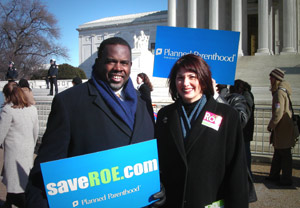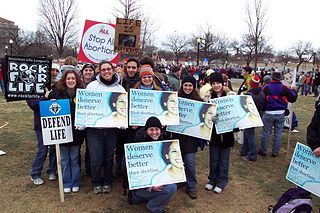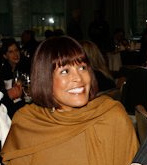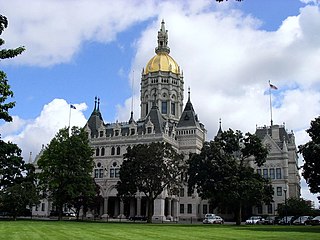Related Research Articles
Roe v. Wade, 410 U.S. 113 (1973), was a landmark decision of the U.S. Supreme Court in which the Court ruled that the Constitution of the United States generally protects a pregnant woman's liberty to choose to have an abortion. The decision, which struck down many U.S. federal and state abortion laws, fueled an ongoing debate in the United States about whether, or to what extent, abortion should be legal, who should decide the legality of abortion, and what the role of moral and religious views in the political sphere should be. It also shaped debate concerning which methods the Supreme Court should use in constitutional adjudication.

The United States abortion-rights movement is a sociopolitical movement in the United States supporting the view that a woman should have the legal right to an elective abortion, meaning the right to terminate her pregnancy, and is part of a broader global abortion-rights movement. The movement consists of a variety of organizations, with no single centralized decision-making body.
Planned Parenthood Federation of America, Inc. (PPFA), or Planned Parenthood, is a nonprofit organization that provides reproductive health care in the United States and globally. It is a tax-exempt corporation under Internal Revenue Code section 501(c)(3) and a member association of the International Planned Parenthood Federation (IPPF). PPFA has its roots in Brooklyn, New York, where Margaret Sanger opened the first birth control clinic in the U.S. in 1916. Sanger founded the American Birth Control League in 1921, which changed its name to Planned Parenthood in 1942.
Reproductive rights are legal rights and freedoms relating to reproduction and reproductive health that vary amongst countries around the world. The World Health Organization defines reproductive rights as follows:
Reproductive rights rest on the recognition of the basic right of all couples and individuals to decide freely and responsibly the number, spacing and timing of their children and to have the information and means to do so, and the right to attain the highest standard of sexual and reproductive health. They also include the right of all to make decisions concerning reproduction free of discrimination, coercion and violence.

Bill Baird is a reproductive rights pioneer, called by some media the "father" of the birth control and abortion-rights movement. He was jailed eight times in five states in the 1960s for lecturing on abortion and birth control. Baird is believed to be the first and only non-lawyer in American history with three Supreme Court victories.

Sexual and reproductive health (SRH) is a field of research, healthcare, and social activism that explores the health of an individual's reproductive system and sexual wellbeing during all stages of their life.

The United States anti-abortion movement contains elements opposing induced abortion on both moral and religious grounds and supports its legal prohibition or restriction. Advocates generally argue that human life begins at conception and that the human zygote, embryo or fetus is a person and therefore has a right to life. The anti-abortion movement includes a variety of organizations, with no single centralized decision-making body. There are diverse arguments and rationales for the anti-abortion stance. Some anti-abortion activists allow for some permissible abortions, including therapeutic abortions, in exceptional circumstances such as incest, rape, severe fetal defects or when the woman's health is at risk.
Byllye Yvonne Avery is an American health care activist. A proponent of reproductive justice, Avery has worked to develop healthcare services and education that address black women's mental and physical health stressors. She is best known as the founder of the National Black Women's Health Project, the first national organization to specialize in Black women's reproductive health issues. For her work with the NBWHP, she has received the MacArthur Foundation's Fellowship for Social Contribution and the Gustav O. Lienhard Award for the Advancement of Health Care from the Institute of Medicine of the National Academy of Sciences, among other awards.

Florynce Rae Kennedy was an American lawyer, radical feminist, civil rights advocate, lecturer and activist.

The National Organization for Women (NOW) is an American feminist organization. Founded in 1966, it is legally a 501(c)(4) social welfare organization. The organization consists of 550 chapters in all 50 U.S. states and in Washington, D.C. It is the largest feminist organization in the United States with around 500,000 members. NOW is regarded as one of the main liberal feminist organizations in the US, and primarily lobbies for gender equality within the existing political system. NOW campaigns for constitutional equality, economic justice, reproductive rights, LGBTQIA+ rights and racial justice, and against violence against women.

Faye Wattleton is an American reproductive rights activist who was the first African American and the youngest president ever elected of Planned Parenthood Federation of America, and the first woman since Margaret Sanger to hold the position. She is currently Co-founder & Director at EeroQ, a quantum computing company. She is best known for her contributions to family planning and reproductive health, and the reproductive rights movement.

Reproductive justice is "the human right to maintain personal bodily autonomy, have children, not have children, and parent the children we have in safe and sustainable communities," according to SisterSong Women of Color Reproductive Justice Collective, the first organization founded to build a reproductive justice movement. In 1997, 16 women-of-color-led organizations representing four communities of color – Native American, Latin American, African American, and Asian American – launched the nonprofit SisterSong to build a national reproductive justice movement. Additional organizations began to form or reorganize themselves as reproductive justice organizations starting in the early 2000s.

Christianity and abortion have a long and complex history, and there are a variety of positions taken by contemporary Christian denominations on the topic. There is only one reference to abortion as a procedure in either the Old Testament or the New Testament books of the Christian Bible; however, certain other passages in the Bible have been interpreted by anti-abortion Christians to mean that abortion is not morally acceptable. While some writers say that early Christians held different beliefs at different times about abortion, others say that they condemned abortion at any point of pregnancy as a grave sin, a condemnation that they maintained even when some early Christians did not view as homicide the elimination of a fetus not yet "formed" and animated by a human soul. Some authors, such as ethicist Benjamin Wiker, have contrasted the prohibition of abortion in later Christian societies with the availability of abortion that was present in earlier Roman society, arguing that this reflects a wider condemnation of pagan practices.

The Chicago Abortion Fund was founded in October 1985 in Chicago, Illinois. Chicago Abortion Fund is a non-profit organization which provides medical referrals and funds to people who are facing barriers in accessing abortion services. The group also may provide logistical, practical, and emotional support as needed and engages in political advocacy work and research in Illinois and beyond. This organization is affiliated with the National Network of Abortion Funds.

Abortion-rights movements, also referred to as pro-choice movements, advocate for legal access to induced abortion services including elective abortion. It is the argument against the anti-abortion movement. The abortion rights movement seeks out to represent and support women who wish to terminate their pregnancy at any point. This movement attempts to establish a right for women to make the choice to have an abortion without fear of legal and/or social backlash. The issue of induced abortion remains divisive in public life, with recurring arguments to liberalize or to restrict access to legal abortion services. Abortion-rights supporters themselves are divided as to the types of abortion services that should be available and to the circumstances, for example different periods in the pregnancy such as late term abortions, in which access may be restricted.
African-Americans', or black Americans, relationship to reproductive methods such as birth control is at the center of many social, political, cultural and economic issues. Attitudes towards this issue are heavily influenced by the usage of birth control policies during American slavery and the Jim Crow era. Other factors include African American attitudes towards sex and reproduction, religious views, and movements towards bodily autonomy.

Loretta J. Ross is an African American academic, feminist, and activist who advocates for reproductive justice, especially among women of color. As an activist, Ross has written on reproductive justice activism and the history of African American women.
The SisterSong Women of Color Reproductive Justice Collective, also known as SisterSong, is a national activist organization dedicated to reproductive justice for women of color. The non-profit defines reproductive justice as the human right to maintain personal bodily autonomy, have children, not have children, and parent the children we have in safe and sustainable communities.

House Bill 5414, passed by the legislature of the U.S. state of Connecticut and signed into law by Governor Ned Lamont on May 5, 2022, as the Reproductive Freedom Defense Act, is intended to protect abortion in the state and expand the procedure's availability. Several of its provisions are responses to the Texas Heartbeat Act, passed in late 2021 and since emulated by two other states, that would prevent enforcements in Connecticut of judgements obtained by lawsuits filed under those laws against abortion providers, patients and those who facilitate them. It also allows more non-physician providers to assist in providing certain types of abortions, codifying a legal opinion. The law will take effect July 1.
References
- ↑ Kathryn Cullen-DuPont (1 August 2000). Encyclopedia of women's history in America. Infobase Publishing. p. 6. ISBN 978-0-8160-4100-8 . Retrieved 4 February 2012.
- 1 2 Whaley, Natelegé. "Black women and the fight for abortion rights: How this brochure sparked the movement for reproductive justice". NBC News. Retrieved 9 January 2020.
- ↑ Gillespie, Marcia (1989). "African American women are for reproductive freedom". Trust Black Women. Archived from the original on 2018-03-08. Retrieved 2018-03-07.
- ↑ "African American Women are for Reproductive Freedom". BCRW Archives. Retrieved 4 February 2012.